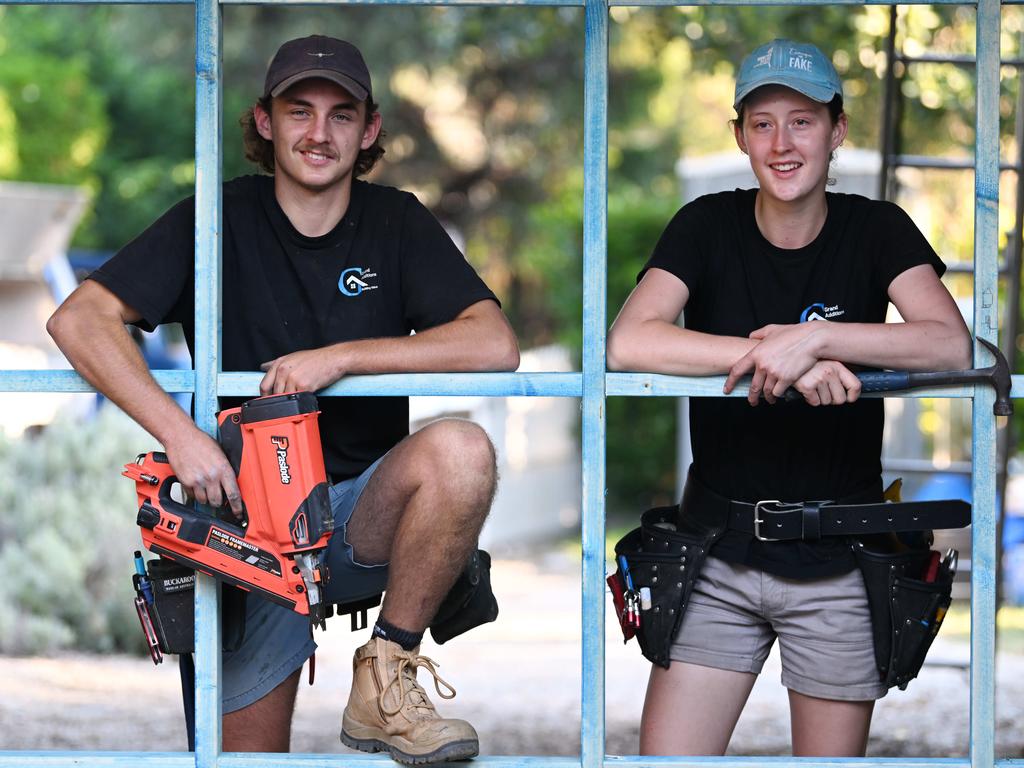Trade groups and universities in tug of war over school leavers
An apprenticeship group has hammered the federal government’s push for more disadvantaged students to get a degree.

Employers of apprentices have warned of worsening trade shortages as the federal government lures more school-leavers into university study.
The National Australian Apprenticeship Association (NAAA) wants university dropouts to switch to a trade instead.
It questions the Albanese government’s plan to pay universities $18,278 to provide remedial bridging courses for every disadvantaged student struggling to get into a degree, at a cost to taxpayers of $350m over the next four years.
NAAA chief executive Ben Bardon said that discouraging students from apprenticeships is “taking ability and just burning it’’.
“Often they’re not academically gifted and typically they will want to take a vocational pathway,’’ he told The Australian.
“A lot of people like learning by doing things with their hands.
“The period of uncapped places at university, and expanding the number of people going to university, has seen a much higher dropout rate (from degree courses).’’
The government’s proposed Fee-Free Uni Ready Courses target students struggling to get into university on academic merit, by providing a year’s catch-up tutoring in areas such as literacy, numeracy and study methods.
But the apprentice group will tell a Senate inquiry into the government’s Student Support legislation on Tuesday that school leavers with a low ATAR (Australian Tertiary Admission Rank) are the most likely to fail at university.
“The dropout rate for these cohorts, particularly where the individual student has an ATAR score below 75, is roughly double the average university dropout rate,’’ Mr Bardon will tell a Senate education committee.
“There is a substitution effect where students who may otherwise have undertaken an apprenticeship are attracted to university courses they then subsequently fail to complete. Increasing university participation will further reduce commencements in apprenticeships at a time where they are already in rapid decline due to a step-down in financial support arrangements for employers of apprentices.’’
Mr Bardon will call for “a referral to an Apprentice Connect Australia provider where students fail to complete a Uni Ready course, or where upon completion they would prefer an alternative tertiary educational pathway’’.
Half of Australia’s trade apprentices are failing to finish their four years of training, due to poverty-level training rates set at two-thirds of the minimum wage.
The former Coalition government paid generous wage subsidies to employers during the Covid-19 pandemic but the Albanese government axed most of them in July.
Only 54 per cent of trade apprentices who started training in 2019 had graduated to a trade four years later, the latest National Centre for Vocational Education Research (NCVER) reveals in its latest data.
Just 54 per cent of apprentices in construction, 58 per cent in the automotive sector and 62 per cent in the electro-technology and communications fields finished their trade training last year.
“NCVER research shows that the most common employment reasons apprentices and trainees left training in 2022 included dissatisfaction with pay or working conditions, and being offered a better job,’’ the NCVER states.
“Changed business conditions can affect an employer’s ability to support training, while personal circumstances and choices made by apprentices and trainees also play a role.’’
As Australia’s housing shortage and high immigration levels fuel rises in home prices and rents, the evidence of tradie shortages raises questions over Labor’s focus on university education at the expense of trade training.
Apprenticeship completions have plunged since 2012, when 60 per cent of apprentices gained trade qualifications.
The NCVER predicts that only 45.7 per cent of apprentices who started work last year will complete four years of training.
Mr Bardon said that while tradies earned good money, apprentice wages – which are as low as $16 per hour in the first year – were forcing many to drop out of training.
“They have the option of getting a 50 per cent pay rise in a job that pays the minimum wage,’’ he said.







To join the conversation, please log in. Don't have an account? Register
Join the conversation, you are commenting as Logout